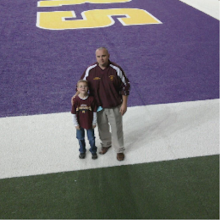"A simple question to ask is, "How has the world of a child changed in the last 150 years?" And the answer is, "It's hard to imagine any way in which it hasn't changed! But if you look at school today versus 100 years ago, it is more similar than dissimilar." -- Peter Senge, senior lecturer, Massachusetts Institute of Technology
What should learning in schools look like in the 21st Century? Are schools preparing students for success in a global society? These are two questions that quickly came to mind when reading the quote above from Peter Senge. It is essential more than ever that schools veer away from methodologies that worked for many years when we were educating a different type of student for a different role in society. Key to this transformation is the integration of authentic learning experiences and technology that engage students of all levels and make learning meaningful.
When I came to New Milford High School in 2004 there were many amazing programs in place. One was the Holocaust Study Tour. This global learning endeavor provides some of our students the opportunity to travel to Europe for at least 10 days and study the Holocaust in depth. This authentic learning experience cannot be reproduced in the classroom. For detailed information on the program please visit The New Milford Holocaust Project.
Technology now allows the students and staff at NMHS to share in the authentic learning experiences taking place in Europe (Germany, Poland, Czech Republic). Last year, we launched a blog where the students in Europe chronicled and reflected on essential questions, focusing on a dark time in human history. Meanwhile, students and staff back on the campus of NMHS are using the blog as a catalyst for a variety of other learning experiences. Some teachers even have their students respond to the posts each day. The first Holocaust Study Tour 2011 blog post should be up tomorrow so be sure to check it out.
Skype has also brought a whole new element to the program. Prior to the trip, students Skyped numerous times with their guide who resides in Israel. This year we even Skyped in a Holocaust survivor to our elective course on the topic. I use Skype to keep in contact with my teacher while on the trip and to sometimes converse with the students about what they are learning. We also encourage our history teachers to Skype with the study tour if the times can be worked out. At our District Open House this Thursday, I plan to Skype the group in from Europe to kick off the event. The theme for the event is appropriately centered around what it is like to be a student in the 21st Century.
It is an exciting time to be in education. Technology has really added a whole new dimension to learning. Schools that confine themselves to a bland curriculum, textbooks, worksheets, or learning activities that do not go beyond the walls of the brick and mortar building are really doing a disservice to their learners. In a society that is now globally connected through easy to use and cost effective web 2.0 tools, opportunities to engage and make the process of learning meaningful to all students has quickly become a reality. Teachers now have at their fingertips many tools to add a global context to any lesson.
For example, Skype in the Classroom is a free community that assists teachers in establishing connections between teachers in different countries to help their students learn. Unfortunately, many schools across the country block blogging tools and Skype as well as a variety of other web 2.0 technologies that foster creativity, collaboration, problem-solving, and communication skills. As Peter Block alluded to, schools have not evolved in step with societal changes. In order to best prepare out students, we must move away from an industrial model of instruction and let go of control in order to meet the diverse needs of today's learner. This will only happen when schools realize that technology is not the enemy and when combined with passionate teachers and visionary schools the end result for students is learning like never before.
